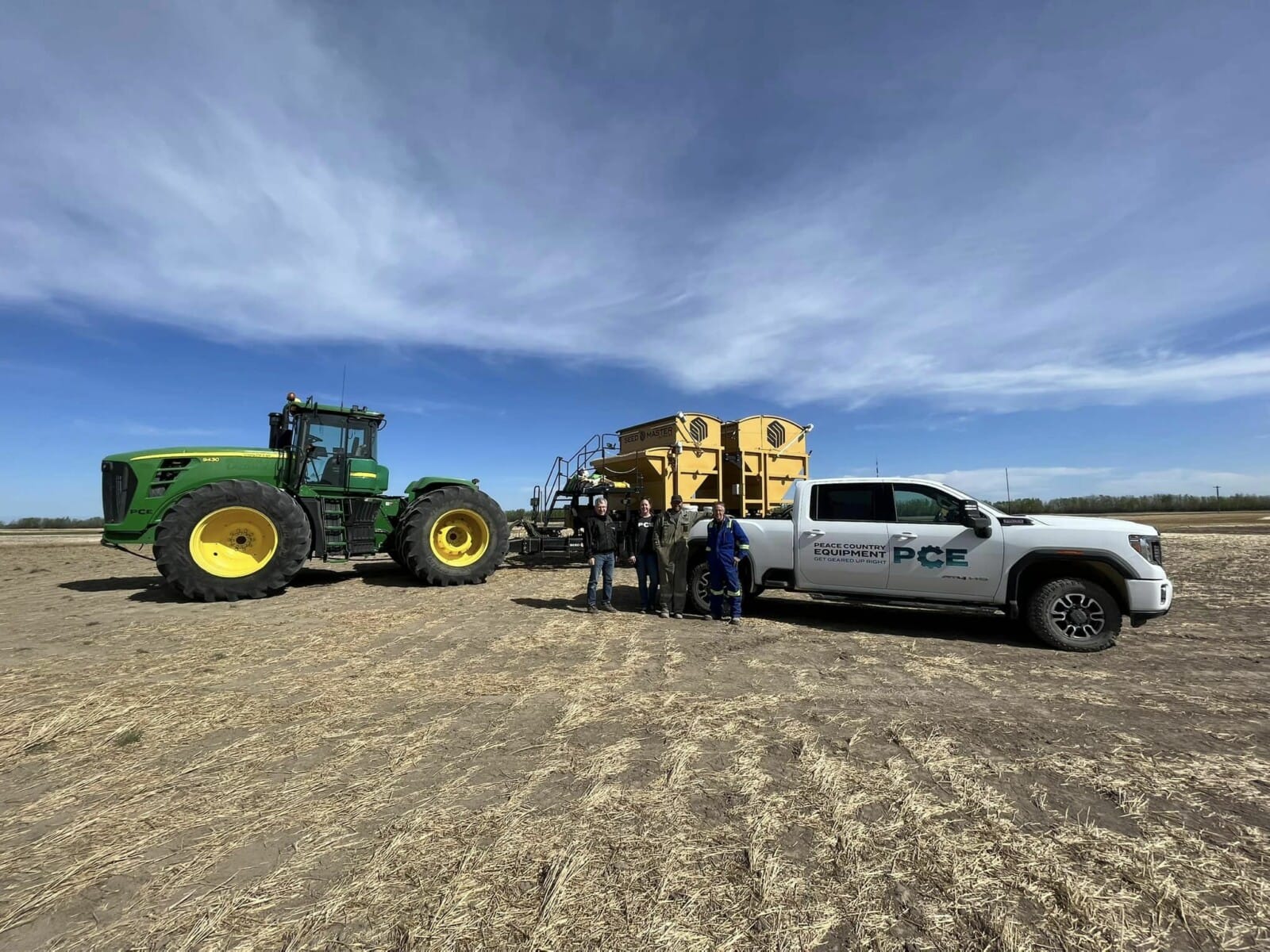
A bountiful harvest
Girouxville parish reaches fundraising milestone with major canola crop project
With a major fundraising project, Our Lady of Lourdes Church in Girouxville has paid off the remaining debt on its new church stairs.
Requiring 160 acres of land, a vast network of volunteers, bags and bags of donated canola, as well as seed drills, combines and other farm equipment – it was certainly not your typical church fundraiser. But after nearly five years of fundraising, no parish was perhaps better equipped with the experience and perseverance needed to pull off a fundraiser of this magnitude.
Since 2019, the Girouxville parish has organized a variety of fundraisers to pay off their front exterior church stairs, from cash calendars, donated steps and even some helicopter-led egg drops. This “capstone” fundraiser was their most ambitious one yet – farming 160 acres of canola crop over the summer to pay off the remaining debt on their new front steps. It required donations from a variety of organizations and labour from willing volunteers throughout the community.
And with an approximately $372,000 bill for those stairs now paid off, there is much relief for all of those who have been painstakingly working to see their church overcome such a crushing debt.
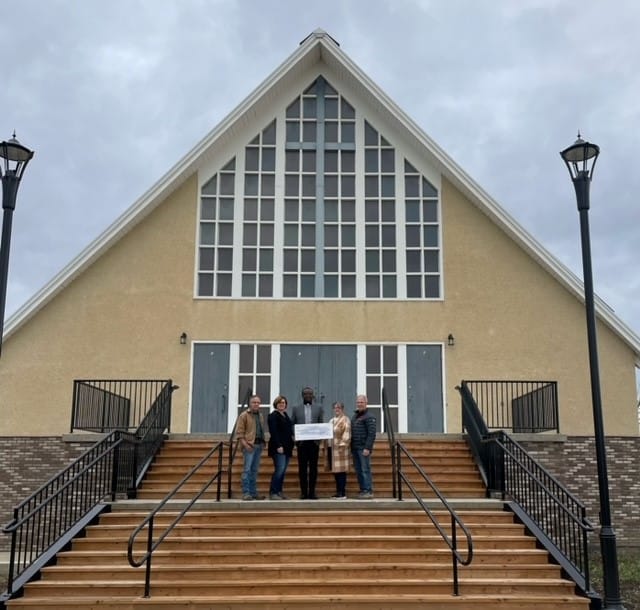
“It feels really good. It’s a huge weight off of our shoulders as a parish,” organizer with the parish fundraising committee Karen Benoit said. “There was a lot of conflict over it. People were very concerned whether a small church like ours could pay this off.”
“The fundraisers especially put a big stress on this community. We would do a handful of big fundraisers each year, bringing in $3,000, $5,000, or $10,000. And then we’d look at our costs and we still had a bill of $180,000 – or whatever it was at the time – left to pay off.
“People were beginning to wonder, ‘How many more egg drops can we do? How many more cash calendars can we do?’ So when we had a project like this that was more profitable – that gave us all a bit more hope. It’s a major relief that we were able to pay our remaining debt off with this one big crop fundraiser.”
It was a combination of pandemic restrictions and massive inflation in the costs of building materials that made the stairs project such a daunting financial challenge for this small rural parish, situated in a community of less than 300 people.
When they finally harvested their canola crop at the end of September, it made them $99,500. This not only covered their remaining debt, the parish also hopes it can help cover future costs as they look at replacing the church doors and installing new side steps.
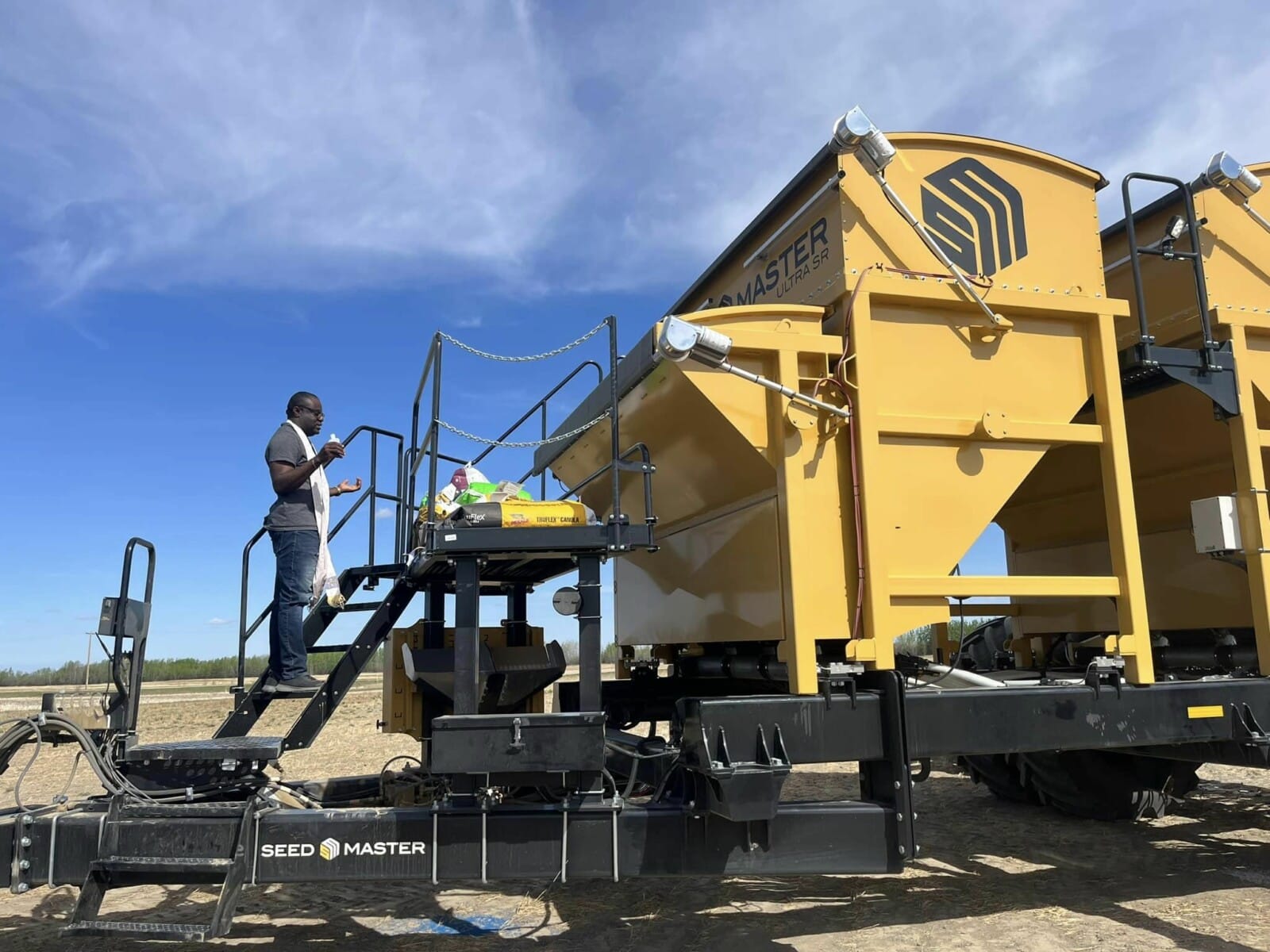
A crop fundraiser was something the church’s fundraising committee had been brainstorming since its early meetings in 2019. Alain Blanchette had proposed the idea, drawing from the annual crop fundraiser the Guy/Donnelly Sportex does each year to offset its costs.
At that time, however, it just remained an idea. And as COVID-19 restrictions delayed their abilities to fundraise, and then the inflated costs of materials skyrocketed their costs, other more immediately achievable fundraisers took priority.
By the spring of 2024, after years of cash calendars, egg drops, a major “donate a step” fundraiser and other efforts, the church was still sitting with roughly $60,000 of debt. It was at that moment that the crop fundraiser began to re-enter the discussion, as the one last ‘hurrah’ they needed to clear off the final portion of their bill.
“We had a good fundraising committee and we had done numerous things, but we were still sitting with that debt,” said parishioner and committee member Denis Boisvert. “We would have to sell a lot of cookies to pay that off, so it seemed like the right time to try something more large scale.”
Such a fundraiser requires a lot of hands willing to give of their resources, time, skills and expertise, from land, seeds, fertilizers, equipment, hard labour and more. Thus, much help would be needed to make the fundraiser a reality.
But thankfully in a community like Girouxville, where everyone either farms or at least have family members who farm, there were many contacts and resources the fundraising committee were able to draw from.
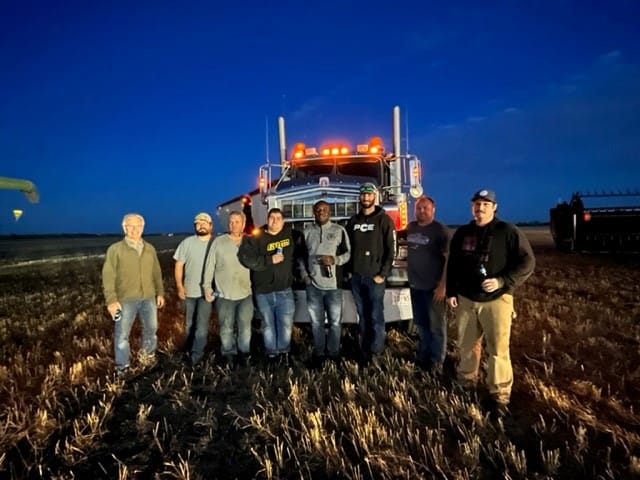
Karen Benoit was willing to let 160 acres of her land be freely rented for the project. For her, it was a way to give back to the parish that had been so supportive during the most trying of times in her life, particularly when her house was severely damaged by a fire, and later when she lost her husband in an accident.
“I had a lot of support from the church community members through everything that I’ve gone through since 2018. This was a good way for me to give back and help the parish,” she said.
Denis took the lead in contacting distributors and companies, given his background as a salesman in the agricultural industry. Alongside getting donations for chemicals and other products, he contacted four different seeding companies with a letter detailing the fundraiser and the financial needs of the church, and in total sixteen bags of canola seed were given.
“I know from my sales days there’s competitive angles you can use to promote yourself. And I knew that if I got one company to donate four bags, the other companies would want to follow suite,” he said. “It worked out good. We put together a letter explaining our cause and what their donations would go towards, and I reached out to a number of my former colleagues.
“I got enough grey hairs that I’ve made a lot of contacts by now, and everyone understood what this was about and that it was needed. It wasn’t a hard sell.”
Thanks to having so many willing to give of their time, products and labour, there was only one major financial expense that came with the project.
“We did have a little expense, which was crop insurance,” Denis explained. “Being a farmer, you’re at the mercy of the winds, rains and weather to produce the crop, so you’ve got to mitigate your risk as much as possible. So we took out crop insurance that was around $2,800. That was through a government program so there was no way to get a deal on that one.”
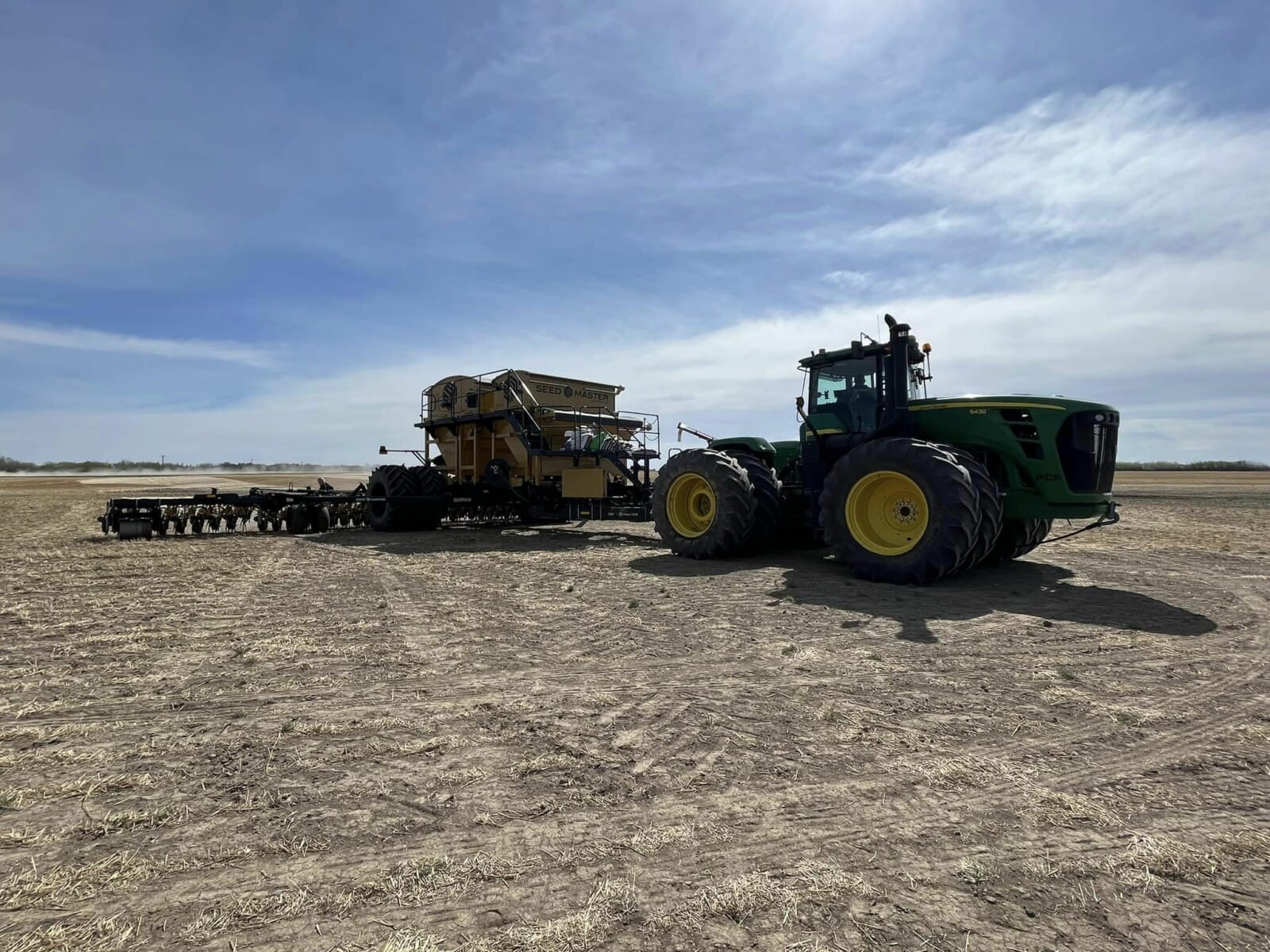
With all the necessary materials successfully donated, the planting was ready to go ahead in May. A volunteer farmer came out with his seed drill and seeded the acres on his own expense. By early June, a neighbour joined in to help spray and fertilize the crops, and then another neighbour volunteered to kill the weeds.
Parish priest Fr. Hansel Nwachukwouji, SMMM did his part too, blessing the seeds and equipment, attentively watching the seed drill and inquiring about each phase of the farming process. The priest even stepped into the combine to help out with the final harvest.
With so many hands on deck and so many different persons and equipment involved, the crop fundraiser soon drew the attention of just about everyone in Girouxville.
“It did become the talk of the town because everyone could see us seeding, and some would come to watch the demos,” said Karen. “When it came to the harvest, we had young volunteers who don’t usually go to church step up to help. In that way, it really brought the community together.”
As it often is when it comes to farming, the weather was a major challenge. Whether it was heat or rain, there were often delays and missed opportunities to work on the crops. But in the end, God’s providence ensured they could harvest a healthy and bountiful crop.
By late September, when the other farmers in the area had finished with their own fields and the weather was right, they were in a good position to gather some volunteers and harvest. On Sept. 24th a team went out with a combine and three grain carts to yield the canola crop. They yielded around 8,000 bushels of canola, delivered to a grain buyer in Nampa, and the fundraising committee walked away with a cheque for $99,500.
“It was a good crop; there was nothing wrong with that figure,” Denis noted. “There’s a lot that had to come into play on that day to make it work. Everything was manned by a good crew – lots of young guys volunteered their time to do it. They were guys who maybe don’t go to church every Sunday, but they recognized the need and saw that this project was a worthy cause. They were willing to donate their time, equipment and their fuel to get this done.”
Because of how complex a fundraiser of this calibre was, Denis notes it may be tough to make this an annual fundraiser for the parish. But even if it will only be a one-time venture, it proved a major success.
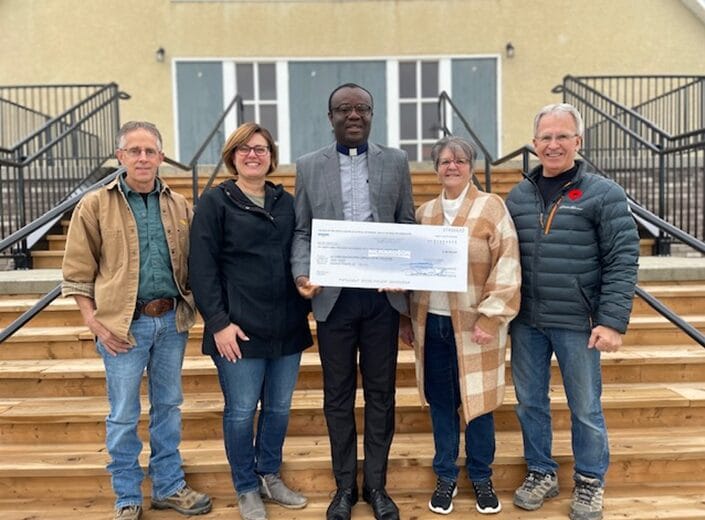
Faced with a project so multifaceted, that required so many contributions, the alignment of so many factors, and so many people in the community willing to give of their time, talents and treasures, it is certainly a relief to now see all these months of fundraising come to a successful completion.
“When I showed up with that cheque there was a lot of hugging and high-fiving,” Denis recalled. “It was a pretty daunting bill to pay. And with all the fundraising we’ve already done everyone was getting exhausted. So this project really capped it all off nicely. Everyone was very pleased.”
When all is said and done and the financial figures are finalized, the parish hopes to have a mortgage burning, inviting everyone who helped them along the way.
“We’d like to do that next spring, just to show our appreciation for all the companies, all the farmers and persons who helped us,” said Denis. “Everyone that volunteered with us did so with no hesitation.”
The achievement particularly has a personal and sentimental meaning for Denis. He’s a descendent of one of the earliest families to settle in Girouxville – his roots in the community going all the way back to 1928. For him, it has all been a way to help keep alive the church that has been the constant spiritual home to his ancestry.
With its grotto, the neighbouring cemetery that is the resting place for many family members and priests who helped found the community, and its annual pilgrimage which remains a long-standing Catholic tradition for the area, Our Lady of Lourdes Church is a key landmark of local history for Girouxville.
That is likely why even those who do not go to church each Sunday were still willing to give their all and help, recognizing the value the church has for both the history and continuance of Girouxville.
“We know that attendance on a Sunday is not high, but when there’s a wedding or a funeral the church fills up. The people here recognize that the church is still a part of who we are, and all that was done to achieve this was their way of contributing to it,” said Denis.
Read the full story in the November 2024 edition of Northern Light